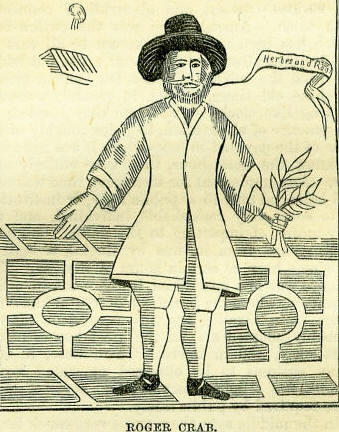
These days you’d be hard-pushed to be a hermit in Bethnal Green. But 300 years ago, when it was a sleepy hamlet, buried in the countryside a couple of miles east of the London wall, it was a different matter.
For the East End was home to a recluse who became an inspiration for Lewis Carroll’s Mad Hatter, whose strange tale brought together Alice in Wonderland and Oliver Cromwell, religion and astrology and medicine and fortune telling.
Roger Crab was originally a Buckinghamshire man and a soldier. He enlisted in the English army, what was to become the New Model Army of Oliver Cromwell, in 1642.
England was in a state of turmoil, embroiled in the series of battles running from 1639 to 1660 which would become collectively known as the English Civil War.
The very hands-on rule of Stuart king Charles I was infuriating Parliament, as was his habit of levying direct taxation without the permission of the Commons.
Crab signed up in 1642, just as Parliament and Charles had fallen out yet again, this time over who should raise an army to put down the Irish rebellion.
The King, affronted at the challenge to his authority, tried to marshal the provinces against a London heavily favouring the Roundheads. He failed, and it was Cromwell who raised the force to viciously suppress the Irish.
Terrifying giant
Crab was a good soldier. Standing a full 6ft 7in – a giant by today’s standards, let alone those of the 17th century – he terrified the men he fought against.
Over the next few years, he travelled with the Roundheads as they viciously crushed revolts in Ireland and Scotland and, for the first time, England totally dominated the British Isles.
But the next challenge was to come from within England. There were constant battles between Royalist and Republican forces, especially following the execution of King Charles in 1649.
The battles of Edgehill, Naseby, Newbury, Marston Moor and the rest peppered the 1640s. But it was probably in the course of the battle for Colchester in 1648 that Crab received the knock that was to change his life forever.
The soldier escaped with his life but was badly stunned by a blow on the head from a Royalist soldier. The injury led to early discharge from the army and he returned to his home town of Chesham, where he set up in business as a hatter.
He was a success but the blow on the head was affecting Crab. He sold the business and gave his money to the poor, opting for a solitary life, living in a tree near Uxbridge.
The formerly strait-laced puritan began to dabble in astrology and ‘physic’ or natural medicine. His philosophy was rather confused but had its roots in a rejection of conventional religion. The former man of war became a pacifist.
He now moved to the secluded village of Bethnal Green, where he subsisted on three farthings a week, eating grass, mallow and dock leaves.
Crab now developed a talent for telling the future. Ironically for a former Roundhead, one of his visions was that the monarchy would be restored and, in 1660, the son of the executed Charles took the throne as Charles II.
And the diet of grass did the old man’s health no harm. He lived to the ripe age of 79, dying in 1680. He is remembered on his tomb in Stepney’s St Dunstan’s churchyard with the following epitaph.
“Through good and ill reports he past, oft censured, yet approved at last ... a friend to everything that’s good.”
And he was remembered again, 200 years later, when Lewis Carroll based his Mad Hatter character in Alice’s Adventures in Wonderland on Crab.
---------------------------------------------------------------------
His epitaph -
'Tread gently, reader, near the dust
Committed to this tomb-stone's trust:
For while 'twas flesh, it held a guest
With universal love possest:
A soul that stemmed opinion's tide,
Did over sects in triumph ride;
Yet separate from the giddy crowd,
And paths tradition had allowed.
Through good and ill reports he past,
Oft censured, yet approved at last.
Wouldst thou his religion know?
In brief 'twas this: to all to do
Just as he would be done unto.
So in kind Nature's law he stood,
A temple, undefiled with blood,
A friend to everything that 's good.
The rest angels alone can fitly tell;
Haste then to them and him; and so farewell!'
eastlondonhistory.com